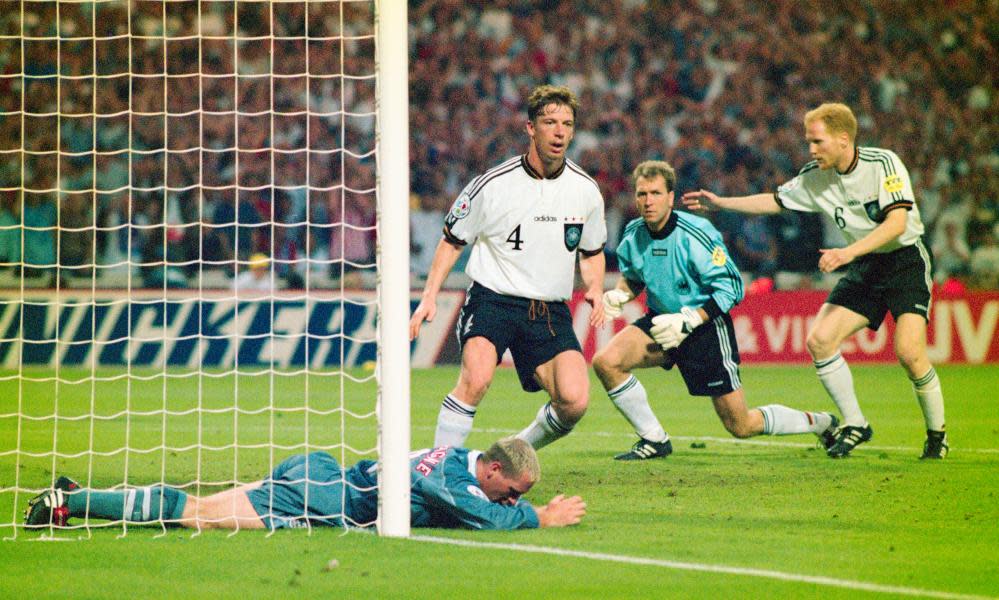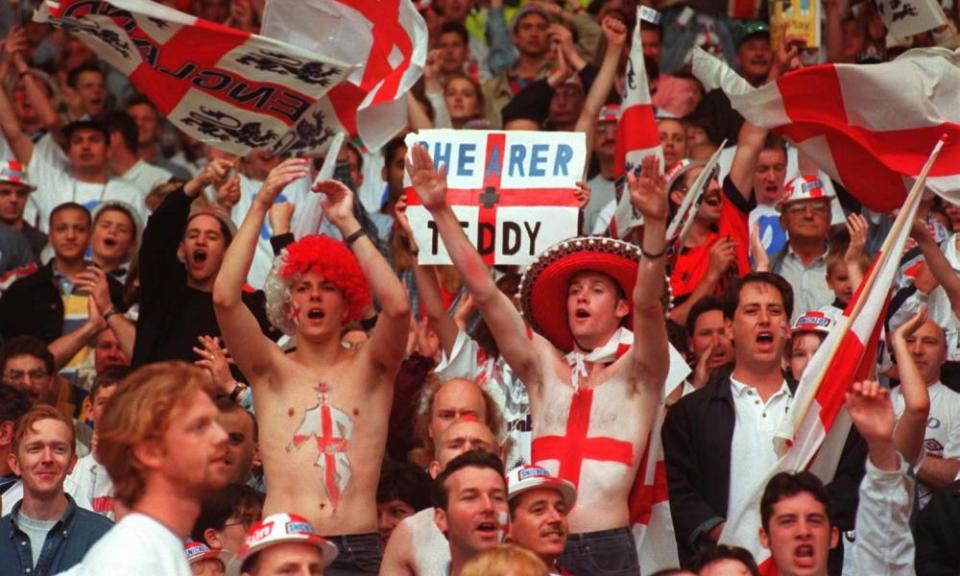From the archive: On Second Thoughts — why Euro 96 was overrated

This article was originally published in July 2007
Tunnel vision is one of the most important qualities in a sportsman, but it is less commendable in spectators. Otherwise you end up with a distorted reality, like Euro 96. In the collective English psyche it was the summer when football came home, when the Three Lions roared and Britannia seeped Cool from every pore. In truth, it was none of the above.
The romantic view of the tournament is inextricably linked to the fact that 1996 was Britain’s second summer of love - a return to the swinging sixties, where On The Buses met Trainspotting; where Britpop and Cool Britannia snuggled up incestuously; a time of Baddiel and Skinner, of Loaded and the first phase of Wags (although given the promiscuity of the age they were more Lags - Lovers And Girlfriends); of Chris Evans, TFI Friday and a phalanx of hangers-on. Indeed, given his penchant for irritating cameos, it’s surprising that Keith Allen didn’t miss the decisive penalty against Germany.
The delusion went so far that spoon-bending tool Uri Geller claimed with an entirely straight face that he was responsible for the freakish movement of the ball ahead of Gary McAllister’s missed penalty against England. And while most subscribers to the great cultural revolution look back not so much in anger as shame - at their Menswe@r CDs and Boston Kickout DVDs, or their ultra-ironic pink ‘Take That Love You’ T-shirts and putrid blue Kappa porno macs (“Damon wore it on TOTP!”) - and accept that this was all the product of what David Stubbs memorably described as “gormlessly patriotic hubris”, football steadfastly refuses to accept the fact. Perhaps that’s because, for many of football’s new gentrification generation, it was their first exposure to what they would soon refer to ad nauseum as the beautiful game. But unforgettable and memorable are not the same thing. Do you remember the first time? I can’t remember a worse time.
Related: On Second Thoughts: Italia 90 | Rob Smyth
At the start of the tournament, football came home; four weeks later, in England at least, it was homeless - suddenly unsure of its identity and whether it belonged at the council house it grew up in or the leafy suburbia to which it now aspired. The process had begun at Italia 90 - if Gazza had known the consequences of his tears, surely he’d have kept a stiff upper lip - but was completed six years later. The summer of love produced the long, long winter of Lovejoy and his Soccer AM cronies, who changed the culture of football in this country forever.
The rhetoric surrounding the tournament - even the official FA website’s review of the tournament talks of “a month of fantastic football” and “huge success” - is spectacularly naïve. This was a diabolical tournament, full of negativity, fear and, as Franz Beckenbauer described France’s approach during the group stages, “lily-livered football”. (It wasn’t the last dose of reality the Germans would administer that summer.) A glance at the average goals per game in the knockout stages - which, with everything to lose and no second chances, act as the clearest window into the soul of a tournament - shows that, with the exception of the less statistically reliable example of 1968, this was a weak European Championship.
1960 5.00 (15 goals in three matches)
1964 3.00 (nine goals in three matches)
1968 1.25 (five goals in four matches)
1972 2.33 (seven goals in three matches)
1976 4.67 (14 goals in three matches)
1980 3.00 (three goals in one match)
1984 3.00 (nine goals in three matches)
1988 2.33 (seven goals in three matches)
1992 3.67 (11 goals in three matches)
1996 1.29 (nine goals in seven matches)
2000 2.86 (20 goals in seven matches)
2004 1.86 (13 goals in seven matches)
NB statistics do not include third-place play-offs, which are not privy to the constrictive pressures of true knockout games

There can be no more damning indictment than the fact that more than half of the knockout matches went to penalties. The new golden goal rule, designed to sex the game up, actually produced 30-minute spells of nervous, blundering foreplay followed by a familiar, unsatisfying climax: a 12-yard shootout. The five golden goal periods produced just one goal in 125 minutes, and that, in the final, came from a truly preposterous howler from the Czech keeper Petr Kouba.
It was apt that a tournament of such low-rent football should conclude on such a note. Apart from the four Ss - Davor Suker, Alan Shearer, David Seaman and the majestic Matthias Sammer - there were arguably no world-class players at their peaks (even the immaculate Paolo Maldini was memorably given the runaround by Karel Poborsky). Euro 96 was a pig of a tournament stuck in the middle of one generation of retired or ageing greats (Matthaus, Gullit, Van Basten, Papin, Rijkaard, Klinsmann, Stoichkov and Hagi) and the next (Zidane, Figo, Thuram and Nedved, who would so illuminate Euro 2000, all made their international debuts here, while Raul and Henry would make theirs at the World Cup two years later).
Related: My favourite game: Uruguay v Ghana, World Cup 2010 quarter-final | John Brewin
A few youngsters caught the eye, but Steve McManaman (the Most Valuable Player, believe it or not) and to a lesser extent Poborsky never truly fulfilled their potential. It said it all that Germany’s Dieter Eilts, a 31-year-old watercarrier, should be one of the stars of the tournament. Not that Eilts and co registered on many radars - any games not involving England were invariably watched by two men and a scout, with attendances miserably low: Russia’s thrilling 3-3 draw with the Czech Republic, for example, was watched by only 21,528 at Anfield.
England’s games, inevitably, were sell-outs, but at least the pride in the Three Lions wasn’t entirely misplaced. Under the managership of Terry Venables, this was an admirably enlightened, flexible and relaxed England side, one for the modern age; they even played a genuine 3-5-2 (with McManaman and Darren Anderton as the wide men, rather than two glorified full-backs) against Scotland and Germany.

But they still weren’t actually that good. They had moments of luck in drawing against Switzerland, chiefly when Marco Grassi located the crossbar from two yards; they were no better than Scotland, except for the 10 minutes after half-time in which the substitute Jamie Redknapp’s slick passing greased some slow-moving wheels and the blur in which Paul Gascoigne scored that splendid goal; and if video replays were available to officials they would have been stuffed 3-0, maybe 4-0, by Spain in the quarter-finals.
So the only two decent performances came in the group stages against a violently underachieving, infighting Holland (who still had more shots and corners than England, despite being beaten 4-1) and the semi-final against the Germans. Just like at Italia 90. Gazza even had comedy breasts for both tournaments (in 1996, alas, they were real). In many ways Euro 96 was just Italia 90 lite: on drama, quality and gravitas. And even the peripherals - the indie song, the kit, the commentaries - weren’t anywhere near as memorable. If Italia 90 was an opera, Euro 96 was a jolly boys’ outing.
The tangible achievement of both sides, reaching the semi-finals, was ostensibly the same, but the two are not comparable. The 1990 vintage are the only England side to reach the semi-finals on foreign soil. In 1996 it was no more than par: every host (or one of the co-hosts) have reached at least the semis of the last six European Championships, and the only reason Italy didn’t in 1980 was because there weren’t any semi-finals.
One thing that was the same - at Euro 80, Italia 90 and Euro 96 - was the name on the trophy at the end: Germany. It’s a delicious irony that, in England’s most famous sporting summer since 1966, when football came home, the Germans took it away with them. They even made the song Three Lions their own. There has been an unconscious attempt to almost airbrush Germany’s victory out of football history, but the reality is that, when the English look down the tunnel of Euro 96, all they see is a big black hole.


